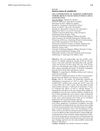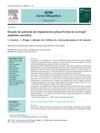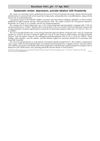 4 citations,
May 2013 in “Actas Dermo-Sifiliográficas”
4 citations,
May 2013 in “Actas Dermo-Sifiliográficas” Most Spanish Caucasian women have a widow's peak, and their hormone levels suggest they process certain hormones faster.
 August 2024 in “PLoS ONE”
August 2024 in “PLoS ONE” Younger Jordanians know more about rosemary, often using it for hair and stomach issues.
 July 2023 in “The journal of sexual medicine”
July 2023 in “The journal of sexual medicine” Anabolic-androgenic steroids harm male hormone levels, sperm, metabolism, and can cause acne, hair loss, and breast growth.
 October 2022 in “Dermatology practical & conceptual”
October 2022 in “Dermatology practical & conceptual” Most injecting drug users in the study had hepatitis C and skin problems, which moderately affected their quality of life.
33 citations,
October 2013 in “Cutaneous and ocular toxicology” Oral cyclosporine can help regrow hair in severe alopecia areata cases.
 29 citations,
October 1996 in “Toxicology and Applied Pharmacology”
29 citations,
October 1996 in “Toxicology and Applied Pharmacology” Higher minoxidil doses in dogs cause faster heart rate, lower blood pressure, and heart issues.
23 citations,
January 2018 in “International Journal of Dermatology” Oral isotretinoin, especially at higher doses for at least 3 months, is effective for treating folliculitis decalvans.
19 citations,
July 2017 in “Clinical and experimental dermatology” Men with lichen planopilaris had earlier onset than women, and treatment usually improved the condition.
 17 citations,
August 2018 in “Journal der Deutschen Dermatologischen Gesellschaft”
17 citations,
August 2018 in “Journal der Deutschen Dermatologischen Gesellschaft” Researchers found that dissecting folliculitis of the scalp is linked to obesity, severity increases with duration and number of nodules, and early treatment is important to prevent scarring.
 16 citations,
January 2012 in “Indian Journal of Endocrinology and Metabolism”
16 citations,
January 2012 in “Indian Journal of Endocrinology and Metabolism” The document suggests that there might be an autoimmune link between polycystic ovary syndrome and Graves' disease.
 13 citations,
January 2014 in “Dermatology”
13 citations,
January 2014 in “Dermatology” Radiation-induced alopecia after angioembolization usually heals on its own and can look like other hair loss types, but patient history helps prevent misdiagnosis.
 10 citations,
May 2013 in “Actas Dermo-Sifiliográficas”
10 citations,
May 2013 in “Actas Dermo-Sifiliográficas” Most white Spanish women have a widow's peak, and their hairline measurements could help in hair restoration surgery.
6 citations,
April 2022 in “Journal of The American Academy of Dermatology” Low-dose oral minoxidil improved hair growth in most pediatric patients with mild side effects.
5 citations,
February 2020 in “Journal of pediatric & adolescent gynecology” Recurrent vaginal bleeding in young girls without puberty signs may require a genital exam to find hidden causes.
1 citations,
January 2022 in “Skin Appendage Disorders” Lupus erythematosus can mimic alopecia areata, and trichoscopy is key for accurate diagnosis and better patient outcomes.
 December 2023 in “Y Dược học”
December 2023 in “Y Dược học” Older adults in Vietnam often experience hair loss after COVID-19, especially women, singles, and those hospitalized.

Hair loss is common in the studied community, often linked to aging and hair care practices like braids, weaves, and chemical relaxers.
 January 2019 in “Indian Dermatology Online Journal”
January 2019 in “Indian Dermatology Online Journal” Stress, hypothyroidism, drug intake, and anemia are important factors in women's diffuse hair loss.
Early diagnosis and treatment of frontal fibrosing alopecia are crucial to prevent permanent hair loss.
 October 2017 in “Iranian Journal of Dermatology”
October 2017 in “Iranian Journal of Dermatology” Clinical exams are good for diagnosing some women's hair loss, but lab tests aren't always needed.
March 2023 in “Civil Medical Journal” Androgenetic alopecia in Nepalese men often starts around age 29, with a possible link to COVID-19 worsening the condition.
 April 2021 in “Reactions Weekly”
April 2021 in “Reactions Weekly” Finasteride increases risk of depression, possibly suicidal thoughts, and sexual dysfunction.
Greater concern about hair loss is linked to more severe hair loss and worse quality of life.
 339 citations,
February 2014 in “Journal of The American Academy of Dermatology”
339 citations,
February 2014 in “Journal of The American Academy of Dermatology” Most patients with frontal fibrosing alopecia are postmenopausal women, and treatments like finasteride and dutasteride can improve or stabilize the condition.
220 citations,
May 2017 in “JAMA dermatology” Patients with hidradenitis suppurativa have a different skin microbiome compared to healthy people.
 166 citations,
April 2012 in “Journal of The American Academy of Dermatology”
166 citations,
April 2012 in “Journal of The American Academy of Dermatology” Mostly postmenopausal Caucasian women get Frontal Fibrosing Alopecia, which often includes eyebrow loss and has limited treatment success.
138 citations,
March 2021 in “Journal of the American Academy of Dermatology” Ritlecitinib and brepocitinib effectively regrow hair in alopecia areata patients.
130 citations,
February 2019 in “JEADV. Journal of the European Academy of Dermatology and Venereology/Journal of the European Academy of Dermatology and Venereology” JAK inhibitors are effective for treating alopecia areata, with most patients seeing hair growth after treatment.
117 citations,
February 1996 in “International Journal of Dermatology” A 300 mg monthly pulse of prednisolone effectively and safely treats widespread alopecia areata.
115 citations,
April 2010 in “Archives of Dermatology” Surgical face-lifts are more effective, but fractional radiofrequency is a good, less invasive alternative for treating skin laxity.
















